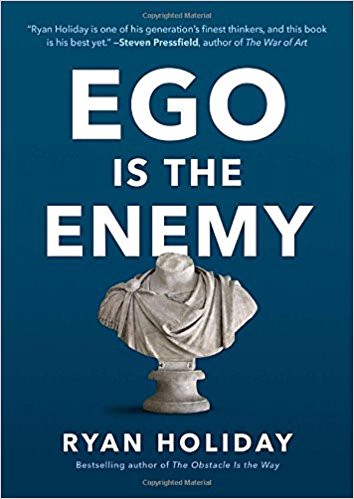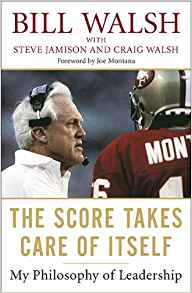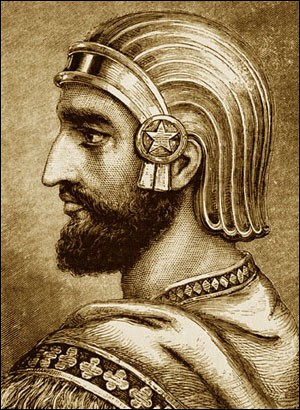
I recently read a fantastic book by Ryan Holiday called Ego is the Enemy. The book provides a very compelling argument for why ego hurts us, and also shares some practical suggestions about how we can manage our ego.
I have definitely been a victim of my ego in the past. I have also seen others (close friends and colleagues) who have made poor decisions, or have generally been unhappy, because of their ego. So this book strongly resonates with me.
What do we mean when we discuss ego? As Holiday writes:
?The ego we see most commonly goes by a more casual definition: an unhealthy belief in our own importance. Arrogance. Self-centered ambition? It?s that petulant child inside every person, the one that chooses getting his or her way over anything or anyone else. The need to be better than, more than, recognized for, far past any reasonable utility ? that?s ego. It?s the sense of superiority and certainty that exceeds the bounds of confidence and talent.?
So why is ego the enemy? There are several reasons:
- Keeps you out of touch with reality
- Creates unrealistic expectations and entitlement
- Makes you dependent on external validation
Keeps you out of touch with reality
One of the biggest reasons why ego is your enemy is that it keeps you out of touch with reality. Your ego is what prevents you from hearing critical but necessary feedback from others. Ego makes you over-estimate your own abilities and worth, and under-estimate the effort and skill required to achieve your goals. All of this means that you lose touch with reality, and you miss opportunities ? to improve, to connect with others, and to achieve your goals.
?If ego is the voice that tells us we?re better than we really are, we can say ego inhibits true success by preventing a direct and honest connection to the world around us? The ways this separation manifests itself negatively are immense: We can?t work with other people if we?ve put up walls. We can?t improve the world if we don?t understand it or ourselves. We can?t take or receive feedback if we are incapable of or uninterested in hearing from outside sources.?
Creates unrealistic expectations and entitlement
Ego makes you assume that you ?deserve? some outcome ? a job offer, a promotion, a sports win, etc. ? because of your past efforts. It creates a feeling of entitlement: I want what?s mine, what?s due to me. I know what I deserve.
?Entitlement assumes: This is mine. I?ve earned it. At the same time, entitlement nickels and dimes other people because it can?t conceive of valuing another person?s time as highly as its own. It delivers tirades and pronouncements that exhaust the people who work for us and with us, who have no choice other than to go along. It overstates our abilities to others, it renders generous judgment of our prospects, and it creates ridiculous expectations.?
Makes you dependent on external validation
If you let your ego take too much control of yourself, you become incredibly dependent on external validation. This validation may take the form of:
- Press coverage, mentions within internal company communications, applause from a crowd
- The praise and admiration of your family, friends, boss, and colleagues
- Extrinsic signals like a higher compensation, big house, fancy car, expensive vacations, impressive title
- Social media likes and follows
Your ego needs and craves this external validation in order to feel satisfied. As Ryan writes:
?Ego needs honors in order to be validated. Confidence, on the other hand, is able to wait and focus on the task at hand regardless of external recognition? [With ego], we need to be recognized. We need to be compensated. Especially problematic is the fact that, often, we get that. We are praised, we are paid, and we start to assume that the two things always go together. The ?expectation hangover? inevitably ensues.?
Ok, so we now know that ego is the enemy, and we have discussed several reasons why this is the case. What can we do about it? Ryan makes a number of suggestions in his book:
- Do something, don?t try to be somebody
- Focus on effort, not outcomes
- Make other people successful
Do something, don?t try to be somebody
 John Boyd, Air Force pilot in Korean War and instructor at Fighter Weapons School
John Boyd, Air Force pilot in Korean War and instructor at Fighter Weapons School
Ryan tells us the story of John Boyd, one of greatest fighter pilots and an instructor at the elite Fighter Weapons School at Nellis Air Force Base. Boyd once gave this advice to one of his students:
??Tiger, one day you will come to a fork in the road. And you?re going to have to make a decision about which direction you want to go.? Using his hands to illustrate, Boyd marked off these two directions. ?If you go that way you can be somebody. You will have to make compromises and you will have to turn your back on your friends. But you will be a member of the club and you will get promoted and you will get good assignments.? Then Boyd paused, to make the alternative clear. ?Or,? he said, ?you can go that way and you can do something ? something for your country and for your Air Force and for yourself. If you decide you want to do something, you may not get promoted and you may not get the good assignments and you certainly will not be a favorite of your superiors. But you won?t have to compromise yourself. You will be true to your friends and to yourself. And your work might make a difference. To be somebody or to do something. In life there is often a roll call. That?s when you will have to make a decision.??
You have a choice: you can try do be somebody impressive, or you can do something impressive. Often when we chase after trying to be somebody, we take shortcuts, we compromise our beliefs, we take more for ourself than we share with others. But when we want to do something, we are motivated more by our purpose than by the external validation that comes with trying to be somebody. We?re willing to work hard, stay true to our purpose and our beliefs, and treat others generously. Because we?re less worried about how much credit, recognition, and rewards we get in our quest to be somebody, and we?re more concerned with how much impact and influence we have in our quest to do something.
Think hard about what motivates your behavior and your choices. Is it to be somebody, or to do something? The next time you?re at a fork in the road, take the ?low ego? path of doing something.
Focus on effort, not outcomes
With almost any endeavor, there is a strong element of luck involved. You may have done everything you could have done to prepare, and you may have very well performed your best. Yet despite all of this, the outcome of your efforts may be negative: ?failure, disrespect, jealousy, or even a resounding yawn from the world.? We can only control our own actions, but we cannot control what other people do. We cannot control the environment. And we cannot control the element of luck.
 ?The Score Takes Care of Itself,? leadership book by 49ers coach Bill Walsh
?The Score Takes Care of Itself,? leadership book by 49ers coach Bill Walsh
As Bill Walsh, 4-time Super Bowl winning coach of the San Francisco 49ers, wrote in his book The Score Takes Care of Itself:
?The final score of a football is decided, on average, according to the following percentages: 20 percent is due to luck, such as a referee?s bad call, a tricky bounce of the ball, an injury, or some other happenstance. I accepted the fact that I couldn?t control that 20 percent of each game. However, the rest of it ? 80 percent ? could be under my control with comprehensive planning and preparation.?
Hence, Walsh focused on developing a Standard of Performance for his players. This Standard of Performance involved perfecting the details for various players: linemen perfected multiple blocking techniques; quarterbacks refined various drop back movements and passing techniques; receivers perfected the details about ?how to be at that exact inch at the exact moment the ball arrived.? Walsh focused on effort and lived with the knowledge that the outcomes (the final 20%) would be determined by luck.
Ryan has a similar take:
?You will be unappreciated. You will be sabotaged. You will experience surprising failures. Your expectations will not be met. You will lose. You will fail.
?How do you carry on then? How do you take pride in yourself and your work? John Wooden?s advice to his players says it: Change the definition of success. ?Success is peace of mind, which is a direct result of self-satisfaction in knowing you made the effort to do your best to become the best that you are capable of becoming.?
?Do your work. Do it well. Then ?let go and let God.? That?s all there needs to be.
?Recognition and rewards ? those are just extra. Rejection, that?s on them, not on us.
?This is why we can?t let externals determine whether something was worth it or not. It?s on us.
?The world is, after all, indifferent to what we humans ?want.? If we persist in wanting, in needing, we are simply setting ourselves up for resentment or worse.
?Doing the work is enough.?
Make other people successful
In order to manage your own ego, focus on making other people successful. By paying attention to other people?s needs, desires, and goals, you are by definition setting aside your ego and self-absorption in order to focus on others. In the process, you are developing a sense of purpose and service within yourself. It?s no longer about you ? it?s about what you can do to help others. When you approach your relationships and your work this way, suddenly you?re not worried about taking things ? whether opportunities, credit, or the spotlight ? for yourself. You?re concerned with giving these things to others. And you build an incredible amount of trust and goodwill with your colleagues and friends when you behave this way.
Ryan writes:
?Imagine if for every person you met, you thought of some way to help them, something you could do for them? And you looked at it in a way that entirely benefited them and not you. The cumulative effect this would have over time would be profound: You?d learn a great deal by solving diverse problems. You?d develop a reputation for being indispensable. You?d have countless new relationships. You?d have an enormous bank of favors to call upon down the road. That?s what the canvas strategy is about ? helping yourself by helping others. Making a concerted effort to trade your short-term gratification for a longer-term payoff. Whereas everyone else wants to get credit and be ?respected,? you can forget credit. You can forget it so hard that you?re glad when others get it instead of you ? that was your aim, after all. Let the others take their credit on credit, while you defer and earn interest on the principal.?
 Portrait of Cyrus the Great
Portrait of Cyrus the Great
This reminds me of a passage from Xenophon?s Cyrus the Great: The Arts of Leadership and War. Cyrus the Great founded the Persian Empire, which extended from the Mediterranean Sea to India, in the 6th century B.C. As he prepared to raise an army, Cyrus consulted with his father, Cambyses. Cyrus recounted his father?s advice about what motivates followers.
?My father went on, asking, ?Do you understand the basic reason why followers stay loyal to their leaders? And do you know the basic reason why followers desert their leaders??
??The loyalty of followers comes from self-interest,? I readily replied. ?When they determine that their leader is no longer acting in their self-interest, their sense of loyalty collapses.??
If people believe that you are acting in their own interests, they will trust and follow you as their leader. The moment they feel like you?re not acting in their interest, you lose their trust and they will leave you. In other words, if you can manage your own ego and make other people successful, you will earn and retain their trust. This is the ?principal? that Ryan refers to above ? the goodwill, the bank of favors that you are building up.
I really enjoyed reading Ego Is the Enemy by Ryan Holiday. All of us have been victims of our egos in the past. We can live much happier and successful lives if we can do a better job of managing our own egos.
There are a few reasons how ego hurts us in our daily lives:
- Keeps you out of touch with reality
- Creates unrealistic expectations and entitlement
- Makes you dependent on external validation
In order to manage our ego, we can remember to approach life with these principles:
- Do something, don?t try to be somebody
- Focus on effort, not outcomes
- Make other people successful
By actively managing our ego, we will be more receptive to diverse perspectives that challenge our thinking. We will be open to new ideas and opportunities. We will be willing to do the work required to achieve great things. We will focus on things that we control (our effort), rather than things we cannot (the outcome). We will build trusted relationships with others, by giving more credit / rewards / opportunities than we take for ourselves. We will develop a sense of purpose and service by making others successful.
Imagine how much more creative, productive, and energized we would be if we always lived life this way. Imagine how fulfilling our relationships would be with others if we can truly manage our own ego. This is what we are striving for. I urge you to take these lessons to heart and apply the principles in your daily lives. I know I will.


